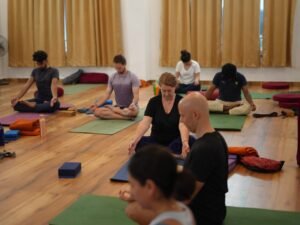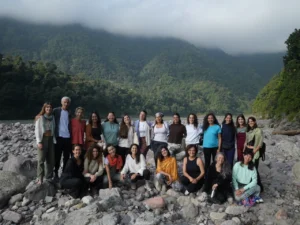The Origins of Yoga: A Journey Through Time
Introduction
Yoga is an ancient practice that has stood the test of time, evolving over thousands of years to become a globally embraced discipline. But where did yoga truly begin? To understand its roots, we must journey back over 5,000 years to the Indian subcontinent, where this profound practice first took shape.
The Meaning of Yoga
The term ‘yoga’ is derived from the Sanskrit word ‘yuj,’ which means ‘to unite’ or ‘to yoke.’ This union signifies the harmony between the body, mind, and spirit—a balance that lies at the heart of yoga philosophy.
Yoga in the Indus Valley Civilization
The earliest evidence of yoga can be traced back to the Indus Valley Civilization, one of the world’s oldest urban cultures. Archaeological discoveries, including seals and figurines depicting yogic postures, suggest that yoga was practiced as early as 3000 BCE.
Yoga in the Vedic Period
Yoga took on a more structured form during the Vedic period. The Vedas, ancient Indian scriptures, contain hymns and rituals that reference yogic practices. The Upanishads, philosophical texts that form the foundation of Hinduism, further expand on yoga’s core principles, including meditation, breath control, and self-realization.
The Bhagavad Gita and the Paths of Yoga
One of the most revered texts in yoga philosophy, the Bhagavad Gita, dates back to the 2nd century BCE. It introduces three major paths of yoga:
- Karma Yoga (The Path of Selfless Action)
- Bhakti Yoga (The Path of Devotion)
- Jnana Yoga (The Path of Knowledge)
Patanjali’s Yoga Sutras: The Foundation of Modern Yoga
Around 400 CE, the sage Patanjali compiled the Yoga Sutras, a seminal text that serves as a guide to yogic practice. Patanjali outlined the eight limbs of yoga, known as Ashtanga Yoga:
- Yama (Ethical Principles)
- Niyama (Self-Discipline)
- Asana (Physical Postures)
- Pranayama (Breath Control)
- Pratyahara (Withdrawal of the Senses)
- Dharana (Concentration)
- Dhyana (Meditation)
- Samadhi (Enlightenment)
The Evolution of Yoga Over the Centuries
Yoga continued to evolve, giving rise to various schools and styles. Hatha Yoga, which emphasizes physical postures and breath control, gained prominence in India and later spread to the West in the 20th century. Today, yoga is practiced worldwide, transcending cultural and geographical boundaries, and promoting health, well-being, and spiritual growth.
Yoga in Rishikesh: The Yoga Capital of the World
At our Yoga School in Rishikesh, we are committed to preserving the ancient wisdom of yoga while adapting it for modern practitioners. Understanding the roots of yoga allows us to deepen our appreciation of this timeless practice and inspires us to live with greater mindfulness and harmony.
Join Us on This Timeless Journey
When you step onto your yoga mat, remember that you are partaking in a tradition that spans thousands of years—a journey that began in the sacred lands of India and continues to evolve with every breath we take.
Join us in Rishikesh, the ‘Yoga Capital of the World,’ and immerse yourself in the rich history and transformative power of yoga.
Namaste!







